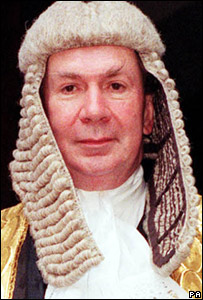Difference between revisions of "Derry Irvine"
| Line 1: | Line 1: | ||
| − | [[Image:Derry Irvine.jpg | + | [[Image:Derry Irvine.jpg|thumb|right|Lord Irvine]] |
Derry Irvine became Lord Chancellor in 1997 after Labour's election victory. [[Tony Blair]] the then Prime Minister chose Irvine for the job. Blair was a former pupil of Irvine's at law firm [[11 Kings Bench Walk]]<ref>Anthony Barnett, [http://www.guardian.co.uk/politics/1999/jun/06/uk.politicalnews1 Job for Irvine friend fuels row over 'Tony's cronies'], ''The Guardian'', 06-June-1999, Accessed 14-August-1999</ref>. | Derry Irvine became Lord Chancellor in 1997 after Labour's election victory. [[Tony Blair]] the then Prime Minister chose Irvine for the job. Blair was a former pupil of Irvine's at law firm [[11 Kings Bench Walk]]<ref>Anthony Barnett, [http://www.guardian.co.uk/politics/1999/jun/06/uk.politicalnews1 Job for Irvine friend fuels row over 'Tony's cronies'], ''The Guardian'', 06-June-1999, Accessed 14-August-1999</ref>. | ||
Revision as of 00:18, 14 August 2009
Derry Irvine became Lord Chancellor in 1997 after Labour's election victory. Tony Blair the then Prime Minister chose Irvine for the job. Blair was a former pupil of Irvine's at law firm 11 Kings Bench Walk[1].
11 Kings Bench Walk Controversy
11 Kings Bench Walk is the law firm of Derry Irvine, Tony Blair and Cherie Blair. In 1999 Anthony Barnett reported in The Guardian that:
- "the old chambers of Irvine and Blair have profited more than any other legal chambers from doing work for the Government - 11 King's Bench Walk in London's Middle Temple has been paid more than £36,000 of taxpayers' money since Labour came to power in May 1997. The figure is five times the average paid to the 24 chambers who have carried out legal work for Irvine's department"[2]
Eric Joyce Controversy
Major Eric Joyce criticised the Army in a Fabian Society pamphlet. Conservative MP Keith Simpson argued that it appeared as if Major Joyce who later became a Labour MP was given political "top cover". During the controversy Lord Chancellor Andrew Irvine had written to the Secretary of State for Defence advising him not to take action against Major Joyce because of the fear that, if the officer took his case to the European Court of Human Rights, any ruling would come up in the run-up to the next election, which "would not be good timing".[3].
Expenses Scandal
Irvine was criticised for refurbishing his home in 1998 by using public money. He spent £59,000 on wallpaper, £145,000 on carpets, £3,000 on a lavatory, £25,000 on an oak dining table, £16,000 on two oak beds and £140,000 on works of art curtains and upholstery. In total the refurbishment cost £650,000 and Lord Irvine declared that "posterity would be grateful"[4]. Contractors working on the residence at The Palace of Westminster were made to sign the official secrets act to shield the expenditure from the gaze of the public eye[5].
Notes
- ↑ Anthony Barnett, Job for Irvine friend fuels row over 'Tony's cronies', The Guardian, 06-June-1999, Accessed 14-August-1999
- ↑ Anthony Barnett, Job for Irvine friend fuels row over 'Tony's cronies', The Guardian, 06-June-1999, Accessed 14-August-1999
- ↑ Keith Simpson, Hansard References, UK Parliament, 9-December-1998, Accessed 14-August-2009
- ↑ Andrew Porter, John Bercow: a look back at the case of Lord Irvine, The Telegraph, 05-August-2009, Accessed 14-August-2009
- ↑ Rachel Sylvester and Robert Winnett, Michael Martin's home gets £1.7m makeover, The Telegraph, 29-March-2008, Accessed 14-August-2009
